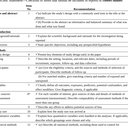Outcome of dengue hemorrhagic fever-caused acute kidney injury in Thai children.
Parole chiave
Astratto
OBJECTIVE
To examine the outcome of acute kidney injury (AKI) in children with dengue hemorrhagic fever (DHF), the cause(s) of AKI, and the risk of AKI and fatality.
METHODS
The medical records of patients age <15 years during 1989 to 2007 were reviewed. DHF-caused AKI and patients with DHF with no AKI were matched 1:2 by age.
RESULTS
DHF-caused AKI was clinically estimated to be 0.9% (25/2893) of admissions, with a high mortality rate of 64.0%. Risk factors of AKI were DHF grade IV and obesity (odds ratio, 16.9; 95% CI, 4.2 to 68.5, and odds ratio, 6.3; 95% CI, 1.4 to 28.8, respectively). Respiratory failure, hepatic failure, and massive bleeding were complications found in 80.0%, 96.0%, and 84.0% of cases with AKI, respectively. Fatality was more likely in cases with DHF grade IV, oliguric AKI, respiratory failure, or prolongation of prothrombin or activated partial thromboplastin time more than twice that of reference specimens. Among the survivors, none had chronic kidney disease, and serum creatinine levels returned to normal in 32 (1 to 48) days.
CONCLUSIONS
Patients with DHF and AKI had a high mortality rate, although those who survived had a full return to normal function within 1 month. DHF grade IV and obesity were the major risk factors of AKI.


